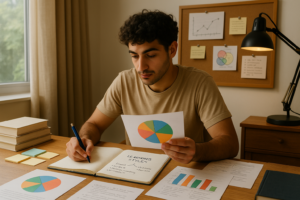The Art of Effective Communication: A Guide for Students
Good communication skills are essential in every aspect of life, from school projects to social interactions and future careers. But effective communication is more than just speaking or writing – it’s about understanding, connecting and expressing yourself clearly. Here’s how you can develop communication skills that will set you apart.
Why Communication Matters
Build Strong Relationships
Clear communication helps build trust and understanding with peers, teachers and future colleagues. Whether it’s working on a group project or resolving a misunderstanding, good communication fosters positive connections.
Boost Academic Performance
Students who communicate well can ask for help when needed, participate in class discussions and present their ideas confidently. These skills can make a significant difference in academic success.
Prepare for the Workplace
In the professional world, effective communication is one of the most sought-after skills. Being able to articulate your thoughts and collaborate with others is essential for career growth.
Key Elements of Effective Communication
Listening Actively
Communication is a two-way street, and listening is just as important as speaking. Active listening means paying full attention to the speaker, showing interest and responding appropriately.
Expressing Clearly
Avoid overcomplicating your message. Use simple language to ensure that your ideas are easy to understand. Clarity builds confidence and ensures your message is received as intended.
Using Non-Verbal Cues
Body language, facial expressions and tone of voice can enhance your message. For example, maintaining eye contact shows attentiveness, while a warm tone makes you approachable.
Adapting to Your Audience
Tailor your communication style to suit the situation or audience. For instance, a formal tone may be appropriate for a presentation, while casual language works better in a group chat.
Practical Tips for Students
Practise Public Speaking
Presenting in front of an audience can be intimidating, but practice makes perfect. Start small by speaking in front of a few friends or joining a debate club. This will help you build confidence.
Improve Writing Skills
Whether it’s emails, essays or text messages, writing is a key form of communication. Practise structuring your thoughts clearly and proofreading your work to avoid misunderstandings.
Ask Open-Ended Questions
Encourage meaningful conversations by asking questions that require more than a yes or no answer. This shows genuine interest and keeps the dialogue engaging.
Handle Conflict Calmly
Disagreements are inevitable, but how you respond makes all the difference. Stay calm, listen to the other person’s perspective and focus on finding a solution instead of assigning blame.
Seek Feedback
Ask teachers or friends for feedback on how you communicate. Constructive criticism can help you identify areas for improvement and build stronger communication skills.
Overcoming Communication Barriers
Manage Anxiety
If fear of public speaking or social interaction holds you back, start small. Practising in low-pressure situations can help reduce anxiety over time.
Address Misunderstandings
If someone misinterprets your message, clarify your intent without becoming defensive. It’s better to resolve issues quickly than let them escalate.
Be Patient with Yourself
Improving communication skills is a journey. Don’t be discouraged by setbacks – every conversation is an opportunity to learn and grow.
Conclusion
Mastering effective communication is a skill that will benefit you throughout your life. By listening actively, expressing yourself clearly and practising regularly, you can build confidence and make meaningful connections with others. Remember, great communication starts with understanding – and that’s a skill anyone can develop.




